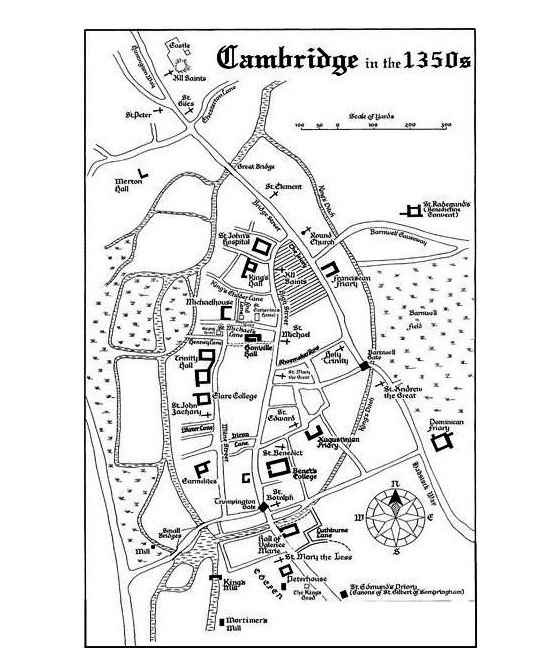Susanna Gregory
TO KILL OR CURE
2007

Ash Wednesday (early March) 1357
When Magister Richard Arderne first arrived in Cambridge, he thought it an unprepossessing place, and almost kept on driving. It was pretty enough from a distance, with a dozen church towers standing like jagged teeth on the skyline, and clusters of red-tiled and gold-thatched roofs huddled around each one. There were other fine buildings, too, ones that boasted ornate spires, sturdy gatehouses and forests of chimneys. Arderne supposed they belonged to the University, which had been established at the beginning of the previous century. From the Trumpington road, in the yellow blaze of an afternoon sun, with the hedgerows flecked white with blossom and the scent of spring in the air, the little Fen-edge settlement was picturesque.
However, when Arderne drove through the town gate, he saw Cambridge was not beautiful at all. It was a dirty, crowded place, full of bad smells, potholed lanes and dilapidated houses. The reek of the river and ditches, which provided residents with convenient sewers as well as drinking water, was overpowering, and he did not like to imagine what it would be like during the heat of summer. The churches he had admired from afar were crumbling and unkempt, and he suspected there was not a structure in the entire town that was not in need of some kind of maintenance or repair. The so-called High Street comprised a ribbon of manure and filth, trodden into a thick, soft carpet by the many hoofs, wheels and feet that passed along it, and recent rains had produced puddles that were deep and wide enough to have attracted ducks.
Arderne surveyed the scene thoughtfully as he directed his cart along the main road. The servants who sat behind him were asking whether they should start looking for a suitable inn. Arderne did not reply. Was Cambridge a place where he could settle? He was weary of travelling, of feeling the jolt of wheels beneath him. He longed to sleep in a bed, not under a hedge, and he yearned for the comforts of a proper home. He wanted patients, too anyone glancing at the astrological configurations and medicinal herbs painted on the sides of his wagon would know that Arderne was a healer.
Like any medicus, the prerequisite for his success was a population that was either ailing or willing to pay for preventative cures. Arderne glanced at the people who walked past him, assessing them for limps, spots, coughs and rashes. There were scholars wearing the uniforms of their Colleges and hostels, with scrolls tucked under their arms and ink on their fingers. There were friars and monks from different Orders; some habits were threadbare, but more were made of good quality cloth. And there were finely clad merchants and foreign traders, smug, sleek and fat. Arderne smiled to himself. Not only were Cambridge folk afflicted with the usual gamut of ailments that would provide his daily bread, but there was money in the town, despite its shabby appearance. Now all he had to do was rid himself of the competition. No magician-healer wanted to work in a place where established physicians or surgeons were waiting to contradict everything he said.
He reined in and flashed one of his best smiles at a pleasant-faced woman who happened to be passing, knowing instinctively that she would be willing to talk to him. Ever since he was a child, Arderne had been able to make people do what he wanted. Some said he was possessed by demons, and that his ability to impose his will on others was the Devil at work; others said he was an angel. Arderne knew neither was true; he was just a man who knew how to use his good looks and unusually arresting blue eyes as a means to getting his own way.
He beckoned the woman towards him. As expected, she approached without demur. He asked directions to the towns most comfortable inn, and was aware of her appreciative gaze following him as he drove away. Most women found him attractive, and he was used to adoring stares. Indeed, he expected them, and would have been disconcerted if Cambridges females had been different from those in the many other towns he had graced with his presence.
The landlord of the Angel tavern on Benet Street was named Hugh Candelby. He was not particularly amenable company, but Arderne soon won him round, and it was not long before they were enjoying a comradely jug of ale together. Ardernes pale eyes gleamed when Candelby described how the plague had taken most of the towns medical practitioners, leaving just four physicians and one surgeon. The physicians were all University men, and were saddled with heavy teaching loads on top of tending their patients. Arderne almost laughed aloud. It was perfect! Now all he needed was a house where he could set up his practice, preferably one that reflected his status as a man who had tended monarchs and high-ranking nobles, and a week or two to reconnoitre and rest his travel-weary bones.
And then, he determined, Cambridge would never be the same again.
Cambridge: three weeks later (Lady Day)
Walter de Wenden was not a good man. As a priest, he had been appointed rector to several different parishes, but he never visited them. He did not care about the welfare of the people he was supposed to serve, and he did not care about his crumbling country churches. He hired vicars to perform the necessary rites, of course, but the plague had taken so many clergy that it was difficult to find decent replacements, especially for the pittance he was willing to pay. So, his flocks were in the hands of half-literate boys and dissolute rogues who would have been defrocked had the Death not created such a desperate shortage of ordained men. But, as long his parishes paid the tithes they owed him, Wenden seldom gave them a moments thought.
He was not a man given to introspection, but he was reflecting on his life as he walked home from visiting his friend, Roger Honynge of Zachary Hostel. Hostels were buildings that contained a handful of students and a Principal who taught them, and were invariably poor. Honynge was better off than most he could afford a fire when he wanted, and there was always food on the table but even so, the flaking plaster and mildew-stained cushions made the fastidious Wenden shudder. He was a Fellow of Clare, a College that enjoyed the patronage of the wealthy Lady Elizabeth de Burgh, granddaughter of the first King Edward. His room was tastefully furnished, and he could afford the best meat, decent wines and dried fruit imported at great expense from France. He allowed himself a self-satisfied smile.
He thought about the evening he had just spent. Honynge and his students had been discussing Blood Relics, an issue so contentious that it was threatening to tear the Church in half, with Dominicans on one side and Franciscans on the other. Wenden was not particularly interested in the debate he was not very interested in scholarship at all, if the truth be known, and was only allowed to keep his Clare Fellowship because he had promised to leave them all his money when he died. He had tried to change the subject usually he and Honynge talked about mundane matters, such as the gambling sessions they both enjoyed on Friday nights or the slipping of standards among bakers since the plague but Honynge was an excellent teacher and his students were bright lads; Wenden had become intrigued by the complex twists and turns of the various arguments, despite his natural antipathy to anything that involved serious thought.
Unfortunately, it meant he was later leaving Zachary Hostel than he had intended. It was already dark, and most people were asleep in their beds. He glanced around uneasily. He was not worried about being fined by beadles for being out after the curfew had sounded it would be annoying to give them fourpence, but he was a wealthy man and would not miss it but Cambridge was an uneasy town, and he did not want to be attacked by apprentices who would love to corner a lone scholar and teach him a lesson.


